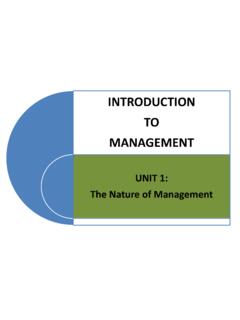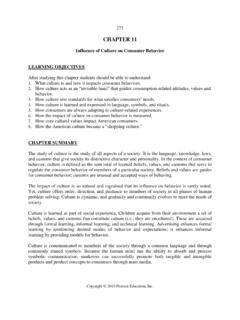Transcription of TABLE OF CONTENTS CHAPTER 2: THE ROLE AND …
1 TABLE OF CONTENTS CHAPTER 2: THE ROLE AND IMPORTANCE OF LOGISTICS Page introduction .. 2 Background and methodology of the CHAPTER .. 2 Logistics - a micro and a macro perspective .. 3 Logistics - a growing area of company focus .. 7 Logistics and supply chain management defined .. 9 The main logistics activities .. 17 Conclusion .. 23 THE DEVELOPMENT OF LOGISTICS MANAGEMENT .. 24 introduction .. 24 The historical development of logistics management .. 25 The increasing focus on the role of logistics .. 26 Current and continuing logistics trends .. 31 Conclusion .. 37 THE MICRO-ECONOMIC ROLE OF LOGISTICS MANAGEMENT .. 38 introduction .. 38 Logistics and company finance and profitability.
2 39 Logistics and marketing .. 48 Logistics and manufacturing .. 55 Role of logistics relative to other key company functions.. 60 Conclusion .. 62 CONCLUSION .. 63 SOURCES OF REFERENCE .. 65 CHAPTER 2 - 1 CHAPTER 2: THE ROLE AND IMPORTANCE OF LOGISTICS introduction Background and methodology of the CHAPTER Companies are today facing increasing levels of competitive pressure and difficulty with regard to maintaining and improving profitability. The management of these companies are being forced to seek and implement innovative strategies with which to advance their company s competitive advantage as well as their profitability. These circumstances and the increasingly complex nature of logistics operations, are causing companies, such as those in the manufacturing sector, to focus on their core competencies, while others provide, for example, some or many of their logistics activities.
3 Companies are also increasingly coming to realise the importance and role of logistics in their organisations and therefore the need for specialist input therein. This CHAPTER of the thesis will discuss, in more detail, important logistics concepts and definitions, some of which were introduced in the preceding CHAPTER , and further introduces concepts and definitions relevant to logistics outsourcing in particular. The CHAPTER also deals with important underlying concepts and definitions of logistics and supply chain management. The information in this CHAPTER also focuses on the meaning, role and importance of logistics and deals with the increasing recognition of the role and importance of logistics and thus the development thereof and trends with regard thereto. This information is of a predominantly descriptive nature and presents the relevant concepts and definitions mainly in an introductory manner but will be clear and in sufficient detail to provide a background to the subjects discussed CHAPTER 2 - 2 subsequently in this thesis and to contribute to the purpose thereof.
4 This is key to the thesis in order to begin to clarify the aspects that will be researched, analysed and discussed. The definitions and classifications discussed in this section have been compiled from a number of sources for the purposes of this thesis. While most definitions and descriptions are fairly brief and provide mainly a background to the subject material, the concepts of logistics, logistics management and supply chain have been defined and described in particular detail, as outsourcing will be in CHAPTER 3, in contribution to the main focus of this thesis. Logistics - a micro and a macro perspective As was outlined in the preceding CHAPTER , which provided an initial introduction to the role and importance of logistics, it is important to note the key role and impact of logistics in the company, on its sustainability, competitiveness and profitability, as well as in the economy of a country.
5 Furthermore, as companies find themselves under growing pressure from both customers and shareholders to seek ways in which to decrease their costs while at the same time increasing performance, they are forced to find ways in which they may improve the efficiency and effectiveness of their operations. These pressures are increasingly impacting the way in which companies, and their customers, view logistics activities. Logistics is thus playing more and more of an important role in company performance, in particular for companies seeking to increase their competitive advantage and corporate profitability. It can be said that companies with a competitive advantage enjoy a position of enduring superiority over competitors, in terms of customer preference, which may be achieved through logistics.
6 The source of competitive advantage is in the ability of the organisation to differentiate itself, in the eyes of the customer, CHAPTER 2 - 3 from its competition, and to operate at a lower cost, and therefore a greater profit than its competitors. Competitive advantage stems from the many discrete activities a company performs in designing, producing, marketing, delivering, and supporting its products. (Porter, 1985; as quoted by Christopher, 1998). Companies are thus increasingly recognising the role and importance of logistics. Companies thus gain competitive advantage by performing such strategically important activities more efficiently than their competitors. (Porter, 1985; as quoted by Christopher, 1998). In so doing they may well find that they are engaging considerable resources in the performing of non-strategically important activities, and may consider outsourcing these to a company that specialises therein.
7 The specialisation and expertise of such a contractor may well provide the company with further competitive advantage in this regard. In the same way that companies seek a competitive advantage over other companies, so too do countries seek to promote their exports by influencing the value of their currency, subsidising certain sectors of their economy, for example by promoting efficiencies in economically important activities such as those involved in the logistics arena. Improved and efficient logistics will make a country s products more attractive from a cost and customer service point of view in the global village. Furthermore, the impact of logistics on a country s land, labour and capital resources; gross national product; rate of inflation, interest rates, productivity, energy costs and availability; as well as employment and standards of living, is also key to the increased focus on logistics and supply chain management in many companies and countries.
8 Logistics is one of the major expenditures for businesses, thereby affecting and being affected by other economic activities. This is well demonstrated by the following figures for the US quoted by Stock and Lambert (2001): In 1999, US CHAPTER 2 - 4 industries spent an estimated $554 billion on freight transportation; more than $332 billion on warehousing, storage, and inventory carrying costs; and more than $40 billion to administer, communicate, and manage the logistics process; the total expenditure on logistics therefore amounting to over $900 billion. In 2001, US business logistics systems costs totalled $970 billion, the equivalent of 10% of the US gross domestic product measured in nominal dollars. (Delaney, 2002, as quoted by Langley, Allen & Tyndall, 2002).
9 World-wide, companies spent about $3 trillion on logistics. (Bank of America; as quoted by Weaser, 2001). Logistics outsourcing is also big business in the US. (Sopher, Lareau & Crum, 2002). In 2000, third-party logistics service providers (3 PLs), for example, generated $ billion revenue in the US, up from $46 billion in 1999, (Armstrong & Associates, 2001; as quoted by Sopher, et al. 2002), and in 2001 estimated total contract logistics market revenues were $ billion. (Armstrong & Associates, 2002; as quoted by Langley, et al. 2002). Logistics is also a huge consumer of land, labour and capital, particularly in industrialised countries where investment in logistics facilities runs into many billions, as can be seen from the above example. As a significant component of gross domestic product (GDP), in the US in 1996, logistics affects the rate of inflation, interest rates, productivity, energy costs and availability, and other aspects of the economy.
10 However it has been reported that the average organisation in the US, for example, could improve its logistics productivity by 20% or more. (Stock & Lambert, 2001). Unchecked, logistics expenditure translates into higher prices for consumers, lower profits for businesses, or both, resulting in a lower standard of living for everyone. It is therefore crucial that South African businesses, as with those in all other countries, improve their logistics productivity. By improving the efficiency of logistics operations, logistics can make an important contribution to the economy as a whole. CHAPTER 2 - 5 Logistics also plays a key role in the economy in that it supports the movement and flow of many economic transactions. It is an important activity with regard to the facilitation of the sale of practically all goods and services.















